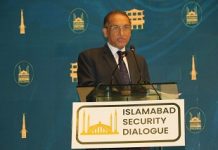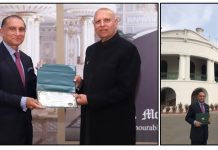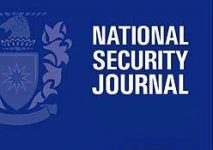Lecture on “SOURCES of Non-Traditional Power”
Today we live in an increasingly complex and evolving geo-political environment where as they say “change remains the only constant”. Similarly, the notion of ‘power’ too is changing its meaning and the modes by which it is exercised. Historically, ‘power’ remains one of the most well-established concepts in political philosophy and practice. Broadly, power is defined as the ability to influence others’ behaviour. A renowned political scientist Joseph Nye elaborates the concept in his work “Global Power Shifts” by introducing the notion of ‘Hard Power’ and ‘Soft Power’. He argues that hard power adheres to all physical coercive military actions and soft power employs the use of national resources that can enhance a nation’s or a group’s ability to affect others without use of force or coercion. The concept of soft power emerged in the late 1980s and ever since become a salient element of diplomacy.
The first half of the 20th century witnessed flagrant use of hard power to achieve political ambitions. However, in the post WWII decades and the Cold War that ensued, brought about a phenomenal change in the conduct of diplomacy, which eventually gave more prominence to the use of non-traditional or soft power to achieve political ends. In the 21st century, the global power dynamics have further evolved. We now see power transitioning from the West to the East as China emerges as a notable global power. Further, states no longer hold monopoly to power. Non-state actors and private groups have emerged in different domains to assert their political, economic or social power. The recent rise of transnational terrorism, technological breakthroughs in information and communication, mega projects of connectivity, challenges of climate change, growing water insecurity have not only added to the complexity of global governance but also enhanced nations’ reliance on unconventional means of defence and security.
In the given context of evolving power dynamics, Pakistan too is striving to re-orient its foreign policy conduct. Pakistan has a significant potential in both traditional sources of national power, such as geography, natural resources, industrial capacity, military preparedness, economic and technological development, human development, quality of governance and leadership, and non-traditional sources of power, such as culture, history, tourism, media development, and role of diaspora. One may refer to the latter as soft power that a country can mobilize in pursuit of its national goals.
Some countries have indeed made an impressive use of soft power to combine with its hard power. Some refer to this combined power as a country’s ‘smart power’. The United States, for instance, has benefitted enormously from Hollywood in spreading the narrative of US being the leading power in every domain. India too has used Bollywood to spread its influence around the world. Switzerland has sold its natural beauty as a paradise on earth attracting tourists from all across. Egypt benefitted from its rich civilizational heritage, especially the pyramids, to create a niche for itself in the world. China too is employing its smart power through geo-economics and technological breakthroughs.
Pakistan too has no dearth of non-traditional sources of power that it can employ to achieve its foreign policy and economic objectives. Some of these are discussed below.
The land of Pakistan is truly a cradle of human civilizations as manifested by its rich archeological heritage in Mehrgarh, Mohenjo-Daro, Harappa, and Gandhara. Dr Michael Jansen, a German historian, who has spent a life time studying Mohenjo-Daro, has often stressed the need for Pakistan to use this tremendous cultural advantage over other nations. Archaeologists from around the world are fascinated by these rich treasures of antiquity that we have. Mehrgarh, for instance is 7000 years old.One can learn from countries like Uzbekistan, which in the recent past, have restored to magnificence its rich cultural heritage sites in Samarkand and Bokhara.
Another area of great potential for Pakistan is tourism, especially mountain tourism and religious tourism. Pakistan has some of the highest peaks in the world, in the mountain ranges of Karakoram (K2, the 2nd highest peak in the world), Himalaya (Nanga Parbat, the 9th highest), and Hindukush (Tirich Mir). K2 is a popular name for mountaineers around the world as it is a much more challenging peak to scale than Mount Everest. Likewise, Pakistan’s land has been a bastion of multiple faiths, from Sufi Islam to Sikhism, to Hinduism, to Buddhism. Once a Sri Lankan foreign minister told me that even a third grader in his country knows where Taxila is. From Sri Lanka to Thailand to Japan, there are scores of nations which revere Buddhist sites in Pakistan. Sikhs from India and indeed all over the world frequent their religious sites every year. The scope is enormous, and if we strategize the religious tourism well, Pakistan would become a highly attractive destination. That in turn would build our image as a tolerant multicultural society.
Pakistan has over eight million hardworking individuals who are living in various parts of the world. Many amongst Diaspora have become the nationals of their host countries, but they maintain a close cultural bond with their home country Pakistan. While every government has counted this as an effective non-traditional source of strength for Pakistan, not much has been done to make fuller use of the enormous influence that our Diaspora has in their host countries and the role they can play to project the true positive image of Pakistan. They are also a rich source of investments in Pakistan and remittances to their families in the country.
Our film industry, which had seen a sharp decline since the eighties, has lately recovering its rhythm, and can play an effective role in projecting our positive image, our culture to millions of people around the world. While Bollywood has been used by India to create a negative image of Pakistan, we can easily counter that through a vibrant film industry, simply because what is shown by our detractors is far from truth. Cultural projection is a science. One needs solid institutions and well considered strategies to project our soft power. India has created an institution called Indian Council for Cultural Relations (ICCR) which has taken lead in establishing Indian cultural centres in various parts of the world. Pakistan has much more to offer than many other comparable countries.
In today’s world, Narrative formation has assumed critical importance in projecting a particular image of a country. For instance, after 9/11, efforts were made by our detractors to associate Pakistan with terrorism and extremism. This is despite the fact that Pakistan was a victim of terrorism and has done far more than any other country in defeating this menace at huge financial and human costs. The victims of such narratives have to struggle hard to shake off an image once it has been formed. Think tanks and academia can help formulate a positive narrative of Pakistan and project its success story in fighting violent extremism as a soft power. Pakistan’s expertise and experience in rehabilitation of extremists and their mainstreaming as responsible citizens can be shared with post-conflict countries and wider world audience to learn from our best practices. Pakistan is one of the top contributors to UN peace keeping missions. Pakistanis are peace loving and known for resilience and dedicated work. Just see the phenomenal construction and development work made possible in the Gulf countries with our labor). The growing proportion of youth in our population is a demographic dividend if we train and educate them well. If we speak honestly to our youth, they are quite capable of understanding and owning up our narratives and can counter misinformation and misperception about Pakistan.
Diplomacy has assumed many forms nowadays. Cultural and Public diplomacy is increasingly becoming an important tool to project soft power. And to this end, very few countries can match the rich sources of non-traditional power that Pakistan has. We must complement our hard power by this enormously rich soft power to achieve our national goals. We need to build our capacity for public diplomacy and provide adequate resources. One important source would be Public-Private Partnerships. There is also a need to strengthen academic and think tank linkages with businesses and multinational corporate entities, all working in harmony with pubic policy practitioners. It would be useful if all our concerned ministries attach due importance to the sources of soft power of Pakistan. Sports, mass entertainment, philanthropy and cultural events could be leveraged more effectively.
—————












